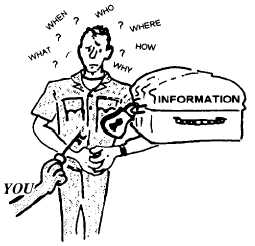| |
rating, you are the all-important link between the
member and these benefits and services.
For a civilian, several places may offer the same or
a similar service. There is usually more than one grocery
store, more than one barbershop, more than one service
station, more than one laundry, and so forth. But, the
situation is very different for the individual in the Navy.
There is only one personnel office, one disbursing
office, one ship’s store, one division office, and so on.
While going through the mess line, you probably
have heard someone criticize the meal only to be
advised, “If you don’t like our food, try the restaurant
across the street.” This advice might have been
acceptable if a restaurant had been located across the
street—but one wasn’t. The person had only one choice:
eat what was offered. Of course, not all criticism is valid;
sometimes it is merely griping. But this example
illustrates the point that most activities normally have
only one place where members can go for a specific
service. They do NOT have a choice.
Since the members do not have a choice, neither do
you! Your service is not to be considered a favor. Rather,
you are meeting your responsibility.
EFFECT OF GOOD/BAD SERVICE
The Navy is definitely affected, either directly or
indirectly, by the service you provide to its members.
Earlier, we said that bad service causes customers to
develop an attitude of resentment. However, seldom do
they restrict that attitude toward the person who gave the
poor service. Instead, they soon generalize that attitude
toward the whole Navy.
Machinery and equipment can be purchased when
needed—conscientious, dedicated people cannot. Thus,
it is apparent that capable people are the Navy’s most
valuable asset. As strange as it may seem, the Navy is
constantly losing these assets—its capable petty
officers. The choice to reenlist or leave the Navy is a
personal matter, and the decision usually represents a
carefully thought-out career plan. But, in some cases, a
member’s decision to leave the Navy has nothing to do
with careful planning. Instead, the member’s decision
has resulted from frustration and dissatisfaction with the
services the Navy has provided. In these cases, the Navy
has lost not only the person but, the investment of
expensive training.
You may ask, What can I do about it? My job isn’t
important! I only perform a personal service or provide
for a personal need. THERE ARE NO UNIMPORTANT
JOBS!
Few changes are made just for the sake of change.
First, a need is recognized, and then new procedures are
developed to meet that need. Recognizing a need is also
the first step in making improvements in the area of a
service. We must understand that even the best of
services have room for improvement. With this in mind,
everyone involved in providing service must recognize
the constant need for improvement.
RECOGNITION OF NEEDS
Before discussing needs, let’s first consider the
people who have them. Everyone in the Navy has needs.
The failure of these needs to be met quite often develops
into problems that far exceed the original needs
themselves. However, the level of service required to
meet their needs and solve their problems varies. For
example, experienced senior petty officers require less
advice and fewer explanations and interpretations than
the less experienced junior petty officers. Since the
experienced members know more about the services to
which they are entitled, they are less likely to accept
poor service. Although all members depend on others
for services, new enlistees, their dependents, and new
civilian employees probably have the greatest need.
The need for improved services is apparent based
on the comments Navy members make. Let’s analyze
members’ desires and feelings as a first step in
determining how improvements can be made:
They want to be regarded as individuals.
1-3
|

